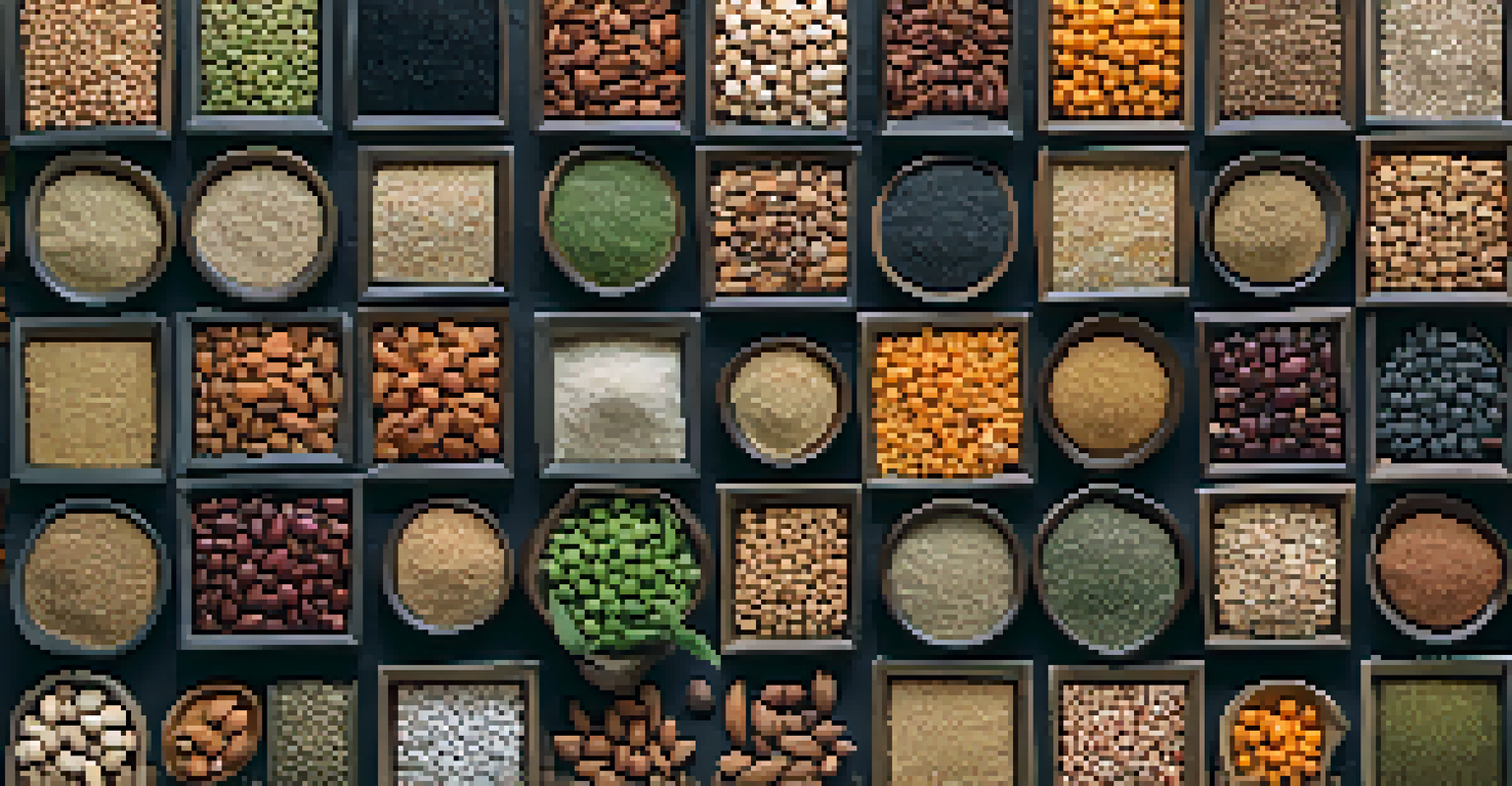Plant-Based Protein Sources: Myths and Facts Debunked

Understanding Plant-Based Proteins: The Basics
Plant-based proteins are derived from a variety of foods, including legumes, nuts, seeds, and grains. These proteins are essential for muscle repair, immune function, and overall health, just like animal proteins. However, many people mistakenly believe that plant-based sources lack sufficient protein quality and quantity.
Let food be thy medicine and medicine be thy food.
It's important to note that the protein content can vary significantly from one plant source to another. For example, lentils and chickpeas are excellent sources of protein, providing about 18 grams per cooked cup. By including a diverse range of plant foods in your diet, you can easily meet your protein needs without relying solely on animal products.
Additionally, plant proteins come packed with fiber, vitamins, and minerals, making them a nutritious choice. This combination not only supports muscle health but also promotes digestive health and reduces the risk of chronic diseases. So, understanding the basics of plant-based protein can help dispel some of the myths surrounding its effectiveness.
Myth 1: Plant Proteins Are Incomplete
One common myth is that all plant proteins are incomplete, meaning they don't contain all nine essential amino acids. While it's true that some plant sources lack one or more essential amino acids, many do provide a complete profile. For instance, quinoa and soy are considered complete proteins, making them exceptional choices for a plant-based diet.

Moreover, you can easily combine different plant foods to create complete proteins. Think of rice and beans or peanut butter on whole-grain bread; together, they provide all the essential amino acids your body needs. This myth can often discourage individuals from exploring the benefits of plant proteins, but the reality is that variety is key.
Plant Proteins Are Nutritious
Plant-based proteins are packed with essential nutrients and can meet protein needs effectively.
Incorporating a diverse range of plant foods throughout the day ensures that you get all the essential amino acids without much effort. By letting go of the idea that you must only rely on animal products, you can embrace the vast array of delicious plant-based options available.
Myth 2: Plant-Based Diets Lack Protein
Another prevalent myth is that plant-based diets simply do not provide enough protein. This concern stems from the misconception that meat is the only viable protein source. In reality, an array of plant foods can provide ample protein, including beans, lentils, tofu, tempeh, and various nuts and seeds.
Eating plants is a great way to get the nutrients you need without the unnecessary calories that can come from animal products.
For example, a serving of chickpeas contains about 15 grams of protein, while a serving of tofu has around 10 grams. When you plan your meals thoughtfully, it's entirely possible to reach and exceed your protein needs on a plant-based diet. Many athletes and fitness enthusiasts thrive on plant-based diets, proving that protein levels are not an issue.
Understanding that a well-planned plant-based diet can meet your protein requirements is crucial. By focusing on whole, nutrient-dense foods, you can enjoy a fulfilling diet while maintaining your health and fitness goals.
Myth 3: Plant Proteins Are Less Nutritious
Some people believe that plant proteins are less nutritious than animal proteins. However, this viewpoint overlooks the array of nutrients found in plant-based foods. While animal products may be higher in certain nutrients like vitamin B12 and heme iron, plant proteins come loaded with antioxidants, fiber, and phytonutrients that support overall health.
For instance, beans and lentils are not only great protein sources but also rich in fiber, which helps with digestion and heart health. Additionally, nuts and seeds provide healthy fats that are beneficial for brain function. This rich nutrient profile makes plant proteins a worthy alternative to animal proteins.
Myths About Plant Proteins Debunked
Common misconceptions, such as plant proteins being incomplete or lacking flavor, are easily dispelled with knowledge.
Instead of viewing plant proteins as inferior, consider them a powerhouse of nutrition. By incorporating these foods into your diet, you can support your health in numerous ways while enjoying a wide variety of flavors and textures.
Myth 4: You Can't Build Muscle on a Plant-Based Diet
A common misconception is that building muscle is impossible on a plant-based diet. This myth is often perpetuated by the image of bodybuilders consuming copious amounts of meat. However, numerous athletes and fitness experts have demonstrated that it is entirely possible to build muscle with plant-based protein sources.
The key lies in ensuring you consume enough protein and calories to support muscle growth. Foods like lentils, chickpeas, quinoa, and even plant-based protein powders can help you reach your protein goals. Many successful athletes, including weightlifters and runners, have adopted plant-based diets and seen remarkable results.
Incorporating strength training along with a balanced plant-based diet can lead to impressive muscle gains. By focusing on adequate nutrition, meal planning, and training, you can achieve your fitness goals without animal products.
Myth 5: Plant-Based Diets Are Expensive
Many people avoid plant-based diets due to the belief that they are costly. While some specialty plant-based products can be pricey, the reality is that whole foods like beans, rice, and seasonal vegetables are often much more affordable than meat and dairy. In fact, staples like lentils and oats are not only budget-friendly but also highly nutritious.
Meal planning and bulk buying can further reduce costs. Preparing meals at home with fresh ingredients allows you to control expenses while enjoying a variety of delicious dishes. Plus, with the rising popularity of plant-based eating, more grocery stores are offering affordable options.
Affordable Plant-Based Eating
Plant-based diets can be budget-friendly, focusing on whole foods like beans and grains instead of costly specialty items.
Ultimately, adopting a plant-based diet doesn't have to break the bank. With a little creativity and planning, you can enjoy nutritious meals that are easy on your wallet.
Myth 6: Plant-Based Proteins Don’t Taste Good
Some individuals shy away from plant-based proteins due to the belief that they lack flavor. This myth couldn't be further from the truth! With the right preparation and seasoning, plant-based proteins can be incredibly tasty and satisfying. Think of flavorful dishes like spicy lentil curry or smoky black bean tacos.
Experimenting with various herbs, spices, and cooking techniques can elevate the taste of plant proteins. Roasting vegetables, grilling tofu, or incorporating sauces can create mouthwatering meals that excite your palate. The culinary world is bursting with delicious plant-based recipes to explore.

By shifting your mindset and trying new flavors, you'll discover that plant-based proteins can be a delightful addition to your meals. Embracing the variety of tastes available will enhance your dining experience and encourage you to enjoy plant-based eating.
Embracing the Truth About Plant-Based Proteins
As we've debunked these common myths, it's clear that plant-based proteins can play a vital role in a healthy diet. From providing complete proteins to being filling and nutritious, these sources deserve a place on everyone's plate. By embracing the facts, you can make informed choices about your nutrition.
Transitioning to a plant-based diet doesn’t have to be an all-or-nothing approach; integrating more plant foods into your meals can offer substantial health benefits. Start with simple swaps, like choosing a veggie burger instead of beef or adding beans to your salads.
Ultimately, whether you're fully plant-based or just looking to incorporate more plant proteins, understanding the truth will help you enjoy a vibrant and nourishing diet. So, let go of the myths and embrace the delicious possibilities that plant-based proteins offer!